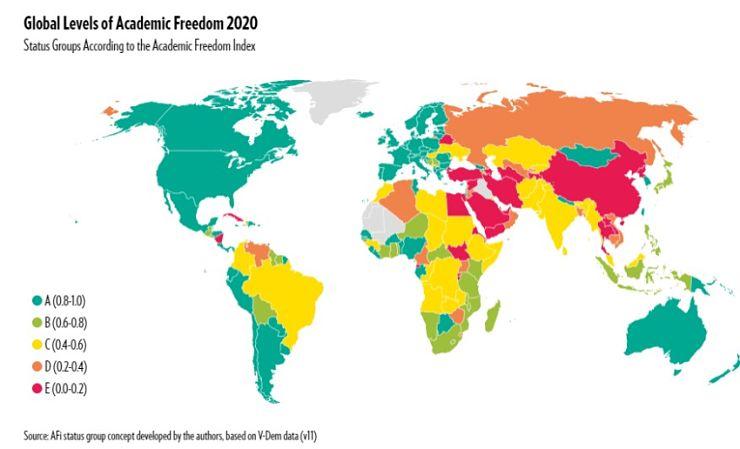Academic freedom remains a cornerstone of higher education, enabling scholars to pursue research and express ideas without undue restriction. In the United Kingdom, this principle continues to spark significant debate amid evolving political, social, and institutional pressures. The American Association of University Professors (AAUP), known for championing academic freedom in the United States, has increasingly turned its attention to developments across the Atlantic, highlighting both challenges and opportunities within UK universities. This article explores the current state of academic freedom in the United Kingdom through the lens of the AAUP’s perspectives, recent controversies, and ongoing efforts to safeguard intellectual autonomy in British academia.
Current State of Academic Freedom in the United Kingdom Explored
In recent years, the landscape of academic freedom within UK institutions has been subject to increasing scrutiny. While universities traditionally uphold the principles of open inquiry and expression, external pressures have introduced new challenges. Recent government policies emphasizing “preventing extremism” and ensuring “balanced teaching” have raised concerns among academics about potential limitations on their ability to explore controversial or dissenting ideas freely. Meanwhile, the rise of social media and public opinion influence also complicate the environment, often placing scholars under intense public and institutional scrutiny.
Key factors influencing academic freedom today include:
- Government regulatory frameworks: New guidelines affecting curriculum content and research funding priorities.
- Institutional policies: Universities’ approaches to handling hate speech and safeguarding inclusivity.
- Public and political pressures: Heightened expectations around ideological neutrality and representation.
| Aspect | Current Status | Potential Impact |
|---|---|---|
| Research Autonomy | Moderate constraints | Possible self-censorship |
| Curriculum Control | Increased oversight | Reduced diversity of perspectives |
| Expression Rights | Protected but evolving | Heightened caution in public discourse |
Challenges Facing Scholars Under New Regulatory Frameworks
The landscape for academic inquiry in the United Kingdom has been notably complicated by the introduction of stringent regulatory frameworks. Scholars now face increased scrutiny over research topics, funding sources, and publication outlets, leading to concerns about the erosion of intellectual autonomy. Institutions, compelled to align with governmental mandates, often impose compliance measures that may inadvertently stifle innovation and critical discourse. This environment has given rise to fears that the transformative potential of academia is being undercut by prioritizing administrative oversight over scholarly exploration.
Key challenges confronting researchers include:
- Restricted Research Agendas: Pressures to conform to politically approved subjects limit the diversity of academic inquiry.
- Compliance Burden: Lengthy approval procedures and reporting obligations detract from time available for original research.
- Funding Vulnerabilities: Dependence on regulated funding streams threatens the independence of scholarly work.
- Risk of Self-Censorship: Increasing surveillance fosters an environment where academics may avoid sensitive topics.
| Challenge | Impact | Recent Developments |
|---|---|---|
| Research Restrictions | Limits on topic selection | New guidelines on content review |
| Increased Compliance | Administrative delays | Implementation of mandatory reporting |
| Funding Constraints | Reduced financial autonomy | Shift towards government-aligned projects |
| Self-Censorship | Decline in academic openness | Rising concerns voiced by AAUP affiliates |
Recommendations for Strengthening Institutional Protections and Policy Reform
To fortify academic freedom across UK institutions, a multi-faceted approach centered on robust legal frameworks and transparent governance is crucial. Universities should be mandated to establish clear policies that protect scholars from undue censorship and external influence, ensuring intellectual inquiry remains uninhibited. Strengthening whistleblower protections and creating independent bodies to oversee complaints related to academic freedom violations will reinforce trust and accountability within the higher education sector.
Key recommendations include:
- Legislative reforms that explicitly codify academic freedom protections in national law
- Regular, government-supported audits of institutional practices regarding academic rights
- Development of collaborative forums between policymakers, academics, and unions to proactively address emerging threats
- Increased funding for independent research on academic freedom trends and challenges
| Policy Area | Recommended Action | Expected Outcome |
|---|---|---|
| Legal Protection | Enact stronger laws safeguarding academic freedom | Clearer rights & fewer disputes |
| Institutional Oversight | Establish independent review panels | Improved accountability |
| Transparency | Mandatory reporting of violations | Better monitoring & awareness |
| Collaborative Dialogue | Regular stakeholder forums | Proactive policy adaptation |
Closing Remarks
As debates around the limits and protections of academic freedom continue to evolve in the United Kingdom, the role of organizations like the AAUP remains pivotal. Their ongoing advocacy highlights the delicate balance between institutional governance and the rights of scholars to pursue knowledge without undue interference. Observers will be watching closely as policymakers, universities, and academics navigate these challenges in the years ahead, striving to uphold the foundational principles that underpin higher education.




